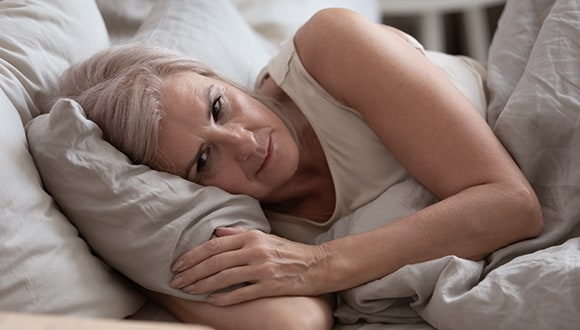Restless leg syndrome: signs, causes and treatments
Restless leg syndrome can cause discomfort, pain and sleep disturbance. But what is it, why does it happen and how can you relieve your symptoms?
Karen Burge
April 2021
Restless leg syndrome (RLS) is often described as a pulling, tingling or crawling feeling, and it can cause significant discomfort and sleep trouble for those who live with it.
RLS is a neurological disorder which causes unpleasant symptoms in the lower limbs and the compelling need to move your legs, according to the Brain Foundation. It can affect any age group but is more common as you get older.
What are the symptoms of restless legs?
Symptoms can include feelings of:
- cramping
- soreness
- creeping and crawling
- shooting darts of electricity
- squirming inside the leg.
Dr David Cunnington is a specialist sleep physician and director of the Melbourne Sleep Disorders Centre. He says RLS symptoms can range from being mild and not causing too much concern to being severe and impacting a person’s quality of life.
“To put that into perspective, about one in six Australian adults pretty regularly get restless legs but they get it fairly mildly. They recognise the feeling and symptoms, and are able to deal with it,” he says.
“Whereas the cases I see are about one in 300 people who get restless legs bad enough that it occurs every day, it’s annoying and it interferes with their ability to sleep.”

Diagnosing restless leg syndrome
There is no specific test for RLS but when diagnosing the condition, doctors will focus on your symptoms and medical history.
“There’s really four key characteristics for restless leg. The irresistible desire or sensation that people need to move; it’s usually worse in the evening; it can be relieved with movement or getting up and moving around; and it can have a sensory component as well that people describe in all manner of ways – tingling in the legs, pins and needles in the legs, shooting pains up the legs,” Dr Cunnington explains. “So, it’s not just about movement, it can also be about sensation.”
What causes restless legs?
What causes RLS is unknown but having a family history explains around half of cases. There are other risk factors, too.
“When people have low iron stores, RLS will be worse,” Dr Cunnington says. “Periods of life when there are typically low iron stores are during pregnancy (particularly second and third trimester); after major surgery like orthopaedic surgery where your iron stores are low because you’re repairing a lot of bone; or if people have been unwell for a period of time which affects their iron absorption.”
Food supplements or preservatives in wine, as well as caffeine can make RLS symptoms worse, he adds. The Brain Foundation includes anti-nausea, anti-seizure and anti-psychotic drugs as well as some cold and allergy medications to the list of potential triggers.
When RLS starts early (before the age of 45) it’s usually because of a family link and tends to progress slower than late-onset RLS, according to Dr Cunnington.
When symptoms start later in life or during pregnancy, they are usually secondary to another conditions, like iron deficiency, chronic kidney disease, peripheral neuropathy (damage to the nervous system) or nerve compression.
Treatment and support
Mild and occasional symptoms can often be self-managed with lifestyle changes, but a specialist referral to a sleep physician, or sometimes a neurologist, will be needed if symptoms become problematic.
“We always start with the lifestyle measures, so that means avoiding caffeine, cutting down on alcohol and making sure people’s iron stores are okay,” Dr Cunnington explains.
If low iron stores are to blame, RLS can be resolved. Dr Cunnington’s recently published research showed mindfulness meditation was effective in reducing symptoms for people with severe RLS.
If those steps aren’t enough, patients will be referred to a specialist. Medications aren’t for everyone but are needed if you're experiencing significant symptoms, Dr Cunnington says.
If restless legs are causing you concern, speak to your GP as they can help you take some initial steps that may significantly improve your health and your sleep.
Related articles
IS COFFEE RUINING YOUR SLEEP?
Find out if that extra daily coffee is causing chaos with your sleep habits.
Is alcohol affecting your sleep?
Did you know alcohol can impact the quality of your sleep and can lead to dependence?
How to know if your sleep is a problem
If you’re finding it hard to sleep on a regular basis, here’s what you need to know.
Coping with a chronic illness
Being diagnosed with a chronic illness can be a challenging time, but your mindset can impact how you cope.